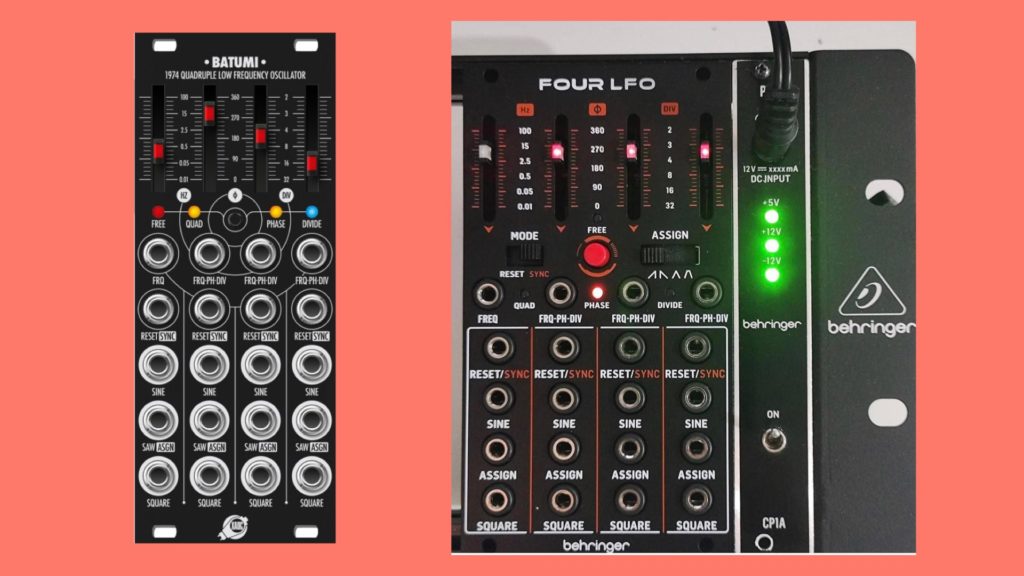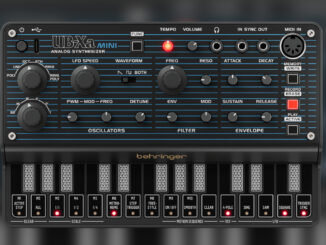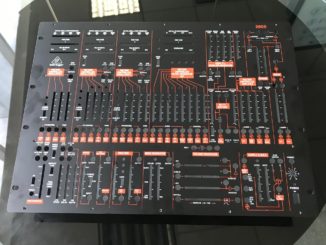Behringer Four LFO is a not-welcome ripoff of the original, lovely Xaoc Devices Batumi quad LFO for Eurorack.
Yesterday, Behringer announced two more clones of Mutable Instruments. Chaos and Surges or clones of the Marbles random modulator and Ripple analog filters. Both are open-source modules.
Now the next module follows. But this time, a not-welcome news and one that I, as a publisher, didn’t support. Four LFO is a ripoff, sorry for the term, of the Xaoc Devices Batumi quad LFO.
Behringer Four LFO
I support many Behringer announcements especially if they are reboots of old designs that have not been available for a long time, and offered for huge sums on eBay, Reverb, etc.
But there are also products that I don’t support at all. These are products that are still on the market from the original developer, like the Swing (Arturia Keystep). I find it even tougher when they are “ripoffs” of original products from small developers. I report about it, it’s my daily job but do not support the product in any way.
Behringer recently did this with the Intellijel Quad VCA. It’s called Four Play, has the same features and costs half as much. Now they have once again dug deep into the bag of tricks of direct copying. With the Four LFO, Behringer shows an authentic ripoff of the Batumi Quad LFO from the Polish developer company Xaoc Devices.
Original Feature Set
- 4 voltage controlled LFOs in one package
- free, quadrature, phase and divide modes
- assignable waveform outputs
- assignable reset/tap tempo inputs
- zoom mode for precise frequency setting
- USB conenctor for alternate firmware
- reversed power protection
I assume the ripoff has the same features as the original Batumi but no confirmation yet.
Update
Because someone felt offended in the comments that I attacked the module, here additional info: yes, the Batumi firmware is under an MIT license, which allows you to copy or modify it. However, the Xaoc Devices module design, layout, etc., is not under the license And so copyright protected.
First Impression
No, no, no, I don’t want to see that from Behringer. As much as I support vintage clones, I don’t want to see these modules on the market. In doing so, they directly damage the original developers in their sales. I welcome a self-developed quad LFO with drawable waveforms and deeper functions. But not a 1-to-1 copy of a module that still exists. And from a small, lovely company.
Behringer Four Play price and availability TBA. Please buy the original unit and support the original developers.
More information here: Xaoc Devices
Available at my partners





Of course I can understand your point. I also think that it is pretty shameless and distasteful but basically Behringers strategy and I guess Uli Behringers desire is to drive all competitors out of the market. It is a very competetive approach. But it is the overall strategy and this is just an incident of that. I just think that criticism should go a little deeper or one should leave it as is. I mean what about Behringers strategy is not clear by now. The Odyssey clone, the MS20 clone, the Tiptop enclosure clone, the moog enclosure clone, of course the Keystep clone, with which they kind of tested the waters. All the products are part of the strategy and of course there would be only one real consequence, not reporting about Behringer at all. Incidental criticism refuses to see the whole structure.
The Economy is not about morals and synthesizer are consumer goods such as anything else. One could say its one of the worst consumerism there is, because people just buy so mmuch of the stuff. Even DIYing synths is consumerism, sometimes even worse, because instead of buying a pre-built synth, you just buy thousands of components, oscilloscopes, multimeters, soldering stations. There is also nothing pure or morally better about being an artist, making music. And small manufacturers are not better than bigger manufacturers. They all want to grow to become bigger, since that is what they have to do. Grow your buiseness or sooner or later you are out of the game.
I guess Behringer wrote their own firmware for the module and cloned the layout and copied the functions of the module. I would be interested if it it is still legal or if its illegal. I would be very interested in that. It would be interesting to hear someone who knows about the legal situation. Otherwise I just think that Behringer makes a good argument in providing cheap gear.
If it’s a totally original cleanroom firmware from Behringer and XAOC haven’t open sourced anything, then legally Behringer is in the clear (in the US, if not in general, this has been the rule since Compaq VS IBM in the 80s). There’s something to be said for them offering similar products to major competitors, like the Keystep/Swing, at a lower price: that’s just market competition.
However selling something that’s a knock-off of a small manufacturer, who is still producing it, is not good practice for the market. Unless theirs does something novel that the XOAC doesn’t, why bother making it other than to screw a small business? It’s not like there’s a shortage of LFO options on the market.
I have no problem with a lot of their products, I own several and I appreciate that they’re trying to make affordable gear and it’s a good business model. But it’s hard to defend something like this.
We had a politician here in Germany some years ago, an artist. It was his first and foremost goal, to drive all the other political parties out of business. And the man was successful, he did it! What happened afterwards you may ask? Well, he raised the prices for the whole world and it got extremely expensive in the end.
Of course that’s how many big companies do it. That doesn’t mean it shouldn’t be condemned or that the big picture is somehow missing.
Die sind skwieso alle ueberteuert so kann man sich das als armer me sch auch leisten punkt
Thank for for reporting but not endorsing this kind of stuff. I like behringer putting out cheaper clones, but leave the small guys who are still putting out originals alone
I agree wholeheartedly.
I doubt there’a anything novel at all about either product other than front panel design.
*nobody* does electronic design from scratch, it’s all borrowed from someone else, an app note, or a previous design. sheesh.
True, but completely irrelevant. At the granular level of circuit design, sure, basically everything is slight tweaks on designs that go back decades. But look at the decision to include X feature over Y, of scaling the knobs so X amount of range is available to the user, what normalled connections to include, whether to retrigger during the attack, decay, both, neither… the higher level “design” of a module (above and beyond mere circuitry) can make truly innovative and creative instruments out of completely run-of-the-mill electronics. And it is a meaningful, harmful “rip-off” for a large company to copy all of those design decisions from a small company’s product.
nah, all those things are old hat too, copied from some other design. maybe when you’re older you’ll get it.
Please show some examples of previous designs that have the same set of features with the same interface.
I am okay with them (or anyone else) cloning vintage gear that has not been available for decades, and I enjoy my RD8 (until my RE-808 is here). But ripping off products by small Eurorack manufacturers that are still on sale is just vicious. They don’t seem to have any form of business ethics whatsoever.
Would still prefere Batumi for the size.
I just thought I would comment about the affordability that behringer is offering I have schizophrenia and cannot work and I basically purchase all my instruments with the inheritance my father left me. I guess you say this behaviour is wrong but behringer is literally giving instruments to less fortunate people in the world! My father was a surgeon and I was alway’s brought up to understand about quality and what a bargain is when buying clothes, food or electronics I think xaoc device’s is overpriced and what behringer is offering is a bargain! If no copyright exists than behringer is just being competitive and offering a bargain!
There is copyright because Xaoc Devices has designed the module from zero. They could start a lawsuit but will lose as Xaoc Devices is a small company from Poland compared to Behringer, a huge corporation. So copy wins against orginality—strange world.
Tom you really don’t get it. Batumi like MI is open source which means it’s intended to invite competition. It has an MIT license and a GitHub repository.
If it wasn’t, XAOC would not have released the firmware.
This selective outrage and misinformed and misleading “journalists” and folks are puzzling. Keep up the great job.
The software is under MIT license yes, but not the hardware layout and design.
“This selective outrage and misinformed and misleading “journalists” and folks are puzzling. Keep up the great job.”
JB I don’t get why this gives you the right to attack someone’s work so harshly. Have we gotten so far that someone feels attacked because someone might have something against a product from a company that the other likes? You can also communicate that normally and positively without directly addressing someone negatively and questioning their job. Strange people
JB it is you who is not understanding or turning blind eye to the fundamental difference.
Mutable Instruments made all design details of their modules open, allowing for non-restricted copying. I’m sure Emillie did not realised the brutalism of the copycats that are all arround and greedily jumped in to shamelessly feed on her designs without offering any original contribution.
In the case of XAOC module, only the firmware is open source, and it is because it is partially based on the open source libraries that MI offered to the public. That means one can take parts or even a whole of it, and develop new products starting from it.
However, the whole hardware design, the whole set of ingenious internal details is clearly NOT open source and is copyrighted. I gues it yet needs to be determined by examinig an actual product whether the hardware has been 1:1 stolen from XAOC, but judging from the blatant copy of the front panel interface, it is indeed.
Behringer had opportunity do make their own 4-channels LFO with better features, but decided to ripoff Batumi exactly for one purpose: to allude they are offering exactly the same product as many may desire (based on its ModularGrid popularity), only cheaper.
Agreed. All modules out there are stupidly overpriced. Making it impossible to even dreaming on having a modular synth.
Cool. Let the fighting and bloodshed begin. Muaaaahahahah
So you want to sit and watch how a small innovative company is ripped off by a corporate predator? You want tmen to bleed out in a legal battle and ultimately fall, just for your amusement?
Kids these days
Yeah, they can suck a fat one on this. The only way they’ll stop is if people don’t buy it. Hopefully casual eurorack fans (are there such people?) do enough research to know to avoid it.
Thank you for taking a stand, it’s brave to do so. I’ll never buy anything with a Behringer logo, the brand stands for laziness and cheap junk.
If you have to buy behringer repros like the 303 copy, buy it used so they don’t make anything. I won’t give them a dime as long as they continue predatory business practices.
Behringer bad amirite
I feel embarrassed for any poor kid who has beh gear in their rack. I’d use vcvrack over anything that freak zombie lich uli releases. Whichever necromancer is keeping him alive is doing the world a disservice.
Problem for small companies is they cant afford copy-protection. Its a shame Behringer waste Time and energy to copy stuff instead of doing new Designs or at least older clones with expanded features. Killing small companies is no good reputation. And if Beringer has killed all companies, whats next if there is no company anymore around to copy?..;)
I support your point of view of course but the fact you are reporting on this product gives Behringer the publicity….
Behringer keep forgetting that they have in-house talent to create their own unique and successful products like the Deepmind and Neutron.
Publicity, maybe, but it’s a news topic, so part of my daily report. Otherwise, I would censor topics that I don’t do.
It’s all about innovaton.
Xaoc did, Behringer didn’t.
If you (the customer) buy such products, you simply cut innovation in music industry.
It would only be fair to ask for a licence where the inventor could profit from fees. I’m pretty sure that Behringer will sell a lot more units with their market power as Xaoc on their own.
fully agree, Tom
I’m always stunned that anyone anywhere would EVER consider purchasing anything from this garbage company.
The Neutron is a good synthesizer. It was developed by Behringer Team Manchester and I bought it years before the Russian invasion. Selling this red beast and filling space with equal modules in a case would would cost, time, energy and at least 1100 Euro.
Poor Behringer always taking the flak for creating affordable product at a reasonable price point.